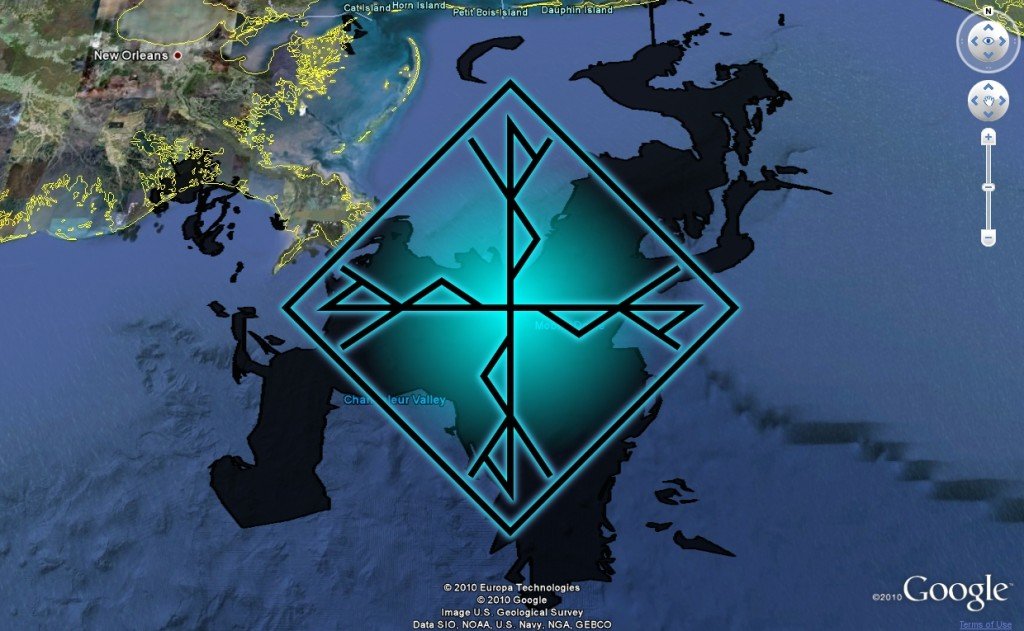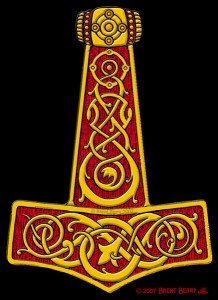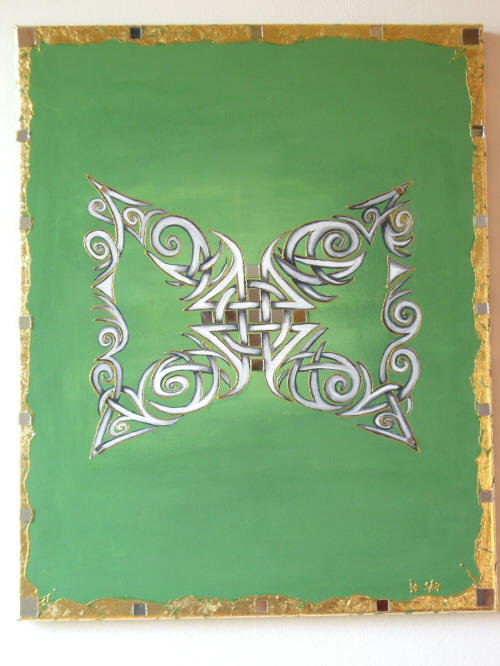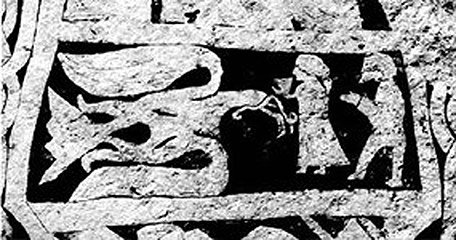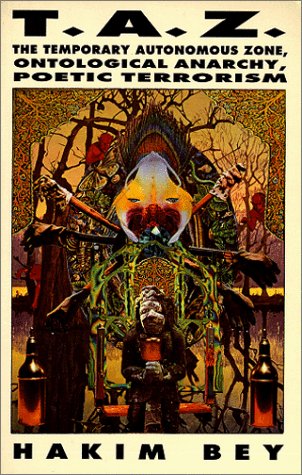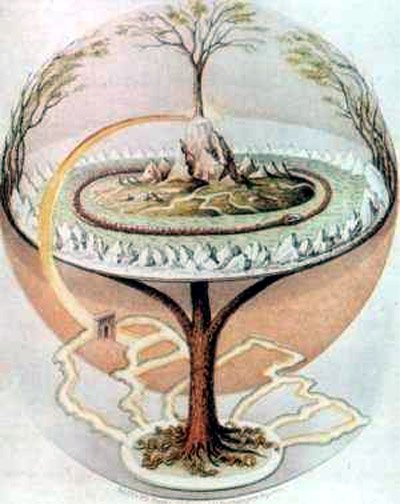
The Runic Seed was planted into my Soul
I have no need for a religious creed
My spirit ascends and is free, without a goal
I heed the Old Man’s advice, who moves with speed
When the world’s veil is pushed aside
Mystery plays with me Hide-and-Seek
Where Her Eternal Forms give birth at night
Attracting the strong, but frightening the weak
We all are Learners on the Runic Path no matter how far we get, Rune Master Ian Read recently wrote in a course he gave at Arcanorium College. I’m not a great fan of online-learning, but Clint pointed me into that direction recently (thanks, bro!) and I joined it for three months. Magical luminaries like Peter Carrol, Dave Lee, Ian Read and many other magicians from the Chaos Magic Current give courses there about all kinds of interesting things: courses on Mind Money & Magick, Following Spare’s Footprints, Galdrastafir, Sorcery & Alternative Science, Kitchen Magic, Aloha Huna Shamanism, Magickal Trance and many other interesting things can be found there. Seekers could learn directly from Pete Carrol to „pursue a bracing and invigorating program of martial magic to empower the inner warrior and to immanentise the eschaton in whatever way participants choose“ in a course he called the Jihad of Chaos. So should you be interested in practical magic and if you need some new approaches or inspiration, that’s the place to go. Ok, enough advertisement. Suffice it to say that the ‘Jihad’ Carrol is talking about is the real one. The Holy War here isn’t about killing, but is a „war of consciousness against conformity“ (Michael Kelly), which means „to stand against ignorance or tyranny“ (Sweyn Plowright) – fighting „against the inertia of the cosmos“ (Don Webb), against the stupidity of man, if you will.
However, recently I heard some people asking for introductory books on Runes. This really made me ponder, because I don’t think this is an easy question to answer. Sure, I have my favourite books. But at a deeper level I believe it doesn’t really matter what kind of books one reads in the beginning, because those dedicated to the Path will find their way ‘any-way’. Further the true meaning of the Runes cannot be found in books, no matter how knowledgable such an author seems to be. But even if this is the case we shouldn’t let people run into the wrong direction just because we somehow found our way inside (wherever that is where we are now). First of all, I should say that I hardly talk about Runes or magic with other persons, because it seems to be a waste of time and energy. (I look back at my teenager years/ early twenties with amusement, when I began to become nervous after five minutes when a conversation moved into a different direction than magic.) Most so-called occultists somehow seem to think that they know better what Runes are all about and that it’s ‘just another system’ and after all it doesn’t matter what kind of system one uses, because all of them lead to the same aim anyway. Really?
If I’d be asked by someone what kind of books I recommend for him or her for learning about the Runes, I had to decide depending on the person. The ‘shamanic type’ should probably begin with Jan Fries’ Helrunar. Those more into a traditional use of Runes should read Thorsson’s Futhark and Runelore. But all would get a copy of Sweyn Plowright’s Rune Primer. However, honestly said I do not think that Runes can be learned from books. It should also be noted that though I’m not absolutely new to Runes, I am considering myself a beginner and am still in the process of becoming familiar with the fundamental literature. (This stement is no wrongly understood modesty. It implies also that I haven’t read through or studied thoroughly every book I recommend. For example, I haven’t read most of the sagas.) It seems to me that in the beginning it makes sense to become familiar with a few academic books like Klaus Düwel’s Runenkunde and R. I. Page’s Runes. Especially the esoteric buff and occultnik should become familiar with the objective facts, regardless of how ‘dry’ or ‘boring’ they seem to be to him or her. Then a certain knowledge of the way our ancestors thought and what they believed could be helpful. The sagas and Hilda Ellis Davidson’s books come to my mind. The dedicated German speaking seeker should study Jan de Vries’ Altgermanische Religionsgeschichte. First then the esoteric works should be taken into account. How to practice ‘Rune Magic’ is next to impossible to explain as everyone will develop his or her own methods over the years, but Thorsson’s, Carrol’s and Fries’ magical methods are a good pointer how to enter this wyrd realm. At this stage subjective meanings will appear that will very likely contradict with (some of) the interpretations of other magical authors. My take on this is: follow your intuition. Noone can help you here except your ‘Deep Mind’ (Jan Fries) or, to say it in a more traditional way, your Fylgja. The only rule is: don’t universalise your own intuitive realisations. It is this subjective stage most of us are engaged in. Some say, there is no other stage to reach (than a subjective one), others are convinced that there is a level of meaning that is reflecting a traditional, objective knowledge. It’s not for me here to decide for you what take is the right one. But I recommend to think about the fact that a purely subjective knowledge will leave us with nothing more than a ‘NiTEiP ‘-attitude that we Chaos Heathens do not subscribe to (please correct me Elhaz fellows, if you disagree). To me this is one of the huge differences between Chaos Heathendom and Chaos Magic.
Let me exemplify how my chaos-magical approach to Runes (rooted in a ‘NiTEiP ‘-attitude) moved from a ‘Personal Gnosis Above All’-belief (PGAA – thanks, Henry!) – that considered my UPG [Unverified Personal Gnosis] as the most important one – towards a traditional approach to the meaning of the Runes (of course always supplemented and deepened by UPGs). When I worked with the ‘astral projection’-method Jan Fries suggests in Helrunar I somehow got to the conclusion that the Ingwaz-Rune – on one level of reference – is an entrance and symbolizes a vagina. I imagined Isa as the penis in this context. (Yes, Mr. Freud, I know it’s all suppressed sexuality, right? Or did I just read too much about Crowley’s sex magick? :-) Ingwaz – seen here as two united Kenaz-Runes – would symbolize fire and heat (sexual arousal) to me. On another, deeper level I saw an ‘alchemical’ process behind these three Runes (Isa, Kenaz, Ingwaz) and thought of the Isa-Rune also as the ‘I’, the ego. The ‘ice’ of the ego – its rigidity and illusory solidity – could be molten by the heat of Kenaz (‘gnosis’ in a CM sense) and so being transformed into ‘Ing’, an enlightened state of being, its essence or true Self. „Man finds his Ing“ has been a beautiful expression for this interpretation that caught my attention in Osborn’s inspiring (albeit rather untraditional) book Rune Games at that time. All this might look quiet weird and exremely subjective to you. Well, it is. But this is somehow the way things work (on a subjective level). And if you ‘feed your mind’ with accurate (traditional) data, better results will come out of your Runic Work. However, at some point I was made aware of the fact at Rune-Net that the traditional meaning of Ingwaz was the opposite of what I came to consider as one layer of its meaning: Ingwaz in no way does represent a vagina or female fertility (the latter meaning being encoded in Berkano amongst others), but rather male fertility manifested in the God Ing. Also the ideographic interpretation of Ingwaz proposed by Thorsson in Futhark is of an erected penis. (Oh yes, there exists Germanic sex magic. And Spare’s method of sigils – as original as it might look at first glance – has been known to our ancestors since centuries in the form of Bind-Runes etc. Always look to tradition first. Never underestimate the wisdom of the ‘ancients in your brain’ [John Balance].) I couldn’t agree more with what Henry has to say about the importance of tradition in his last article:
„I find that the more I research actual magical traditions the more I realise that the average modern occultist or Heathen has far inferior ideas to those that mythological or occult traditions have left behind. We really need tradition as a source of material for our creative, spiritual, and unconscious aspects to weave into reality. The depth and texture of a whole magical ideology cannot possibly be replicated in the half hearted attempts of individual seekers of whatever sort to invent their own. How can one person compete with centuries of people organically and indirectly collaborating across the ages?“
The same has been recently said by my brother, Hubert, who wondered how shallow Crowley’s Thelemic ‘mythology’ appears when it is compared to the richness, profundity and subtlety of the ancient Lore of our forefathers and foremothers. So I started to explore the traditional meaning of this Rune (Ingwaz) and, after that one, of all other Runes of the Elder Futhark. It’s not easy to let go of subjective ‘insights’ or visions and your own UPGs in favour of an ‘objective tradition’. But looking back, I think, this is exactly the point where I began to discover the far richer and greater worlds of ‘Runic Magic’ than before. All modern occultisms appear to me today as totally artificial, deficient and illusory ivory towers lacking the power and tested ‘down-to-earth’ approach of tradition. (Again, as said in another post, read Flowers’ The Northern Dawn before saying that our tradition is lost and unaccessible to us anymore.) I think that I knew intuitively about this intrinsic constructional flaw of western occultism, that’s why I always peered to the East until my Eye has been attracted by the strangely shining, northern Noxia-Licht [night-light] of Thule. The difference between the occult systems of the modern age and the Runic system of old is that in the latter there is no ‘final aim’, ‘last explanation of everything’, ‘final revelation of God’ or final state of consciousness like ‘Nirvana‘, ‘Eternal Bliss‘, ‘Samadhi‘ or ‘Heaven‘. If anything, there is the will to power, to continuance and enjoyment of life and the expansion of consciousness. I find these aims are of great importance today.
“The joy of life consists in the exercise of one’s energies, continual growth, constant change, the enjoyment of every new experience. To stop means simply to die. The eternal mistake of mankind is to set up an attainable ideal.” (Aleister Crowley)
The expansion of consciousness and continuation of life can be seen as the sole dictums of evolution itself. That’s why the attempt of some Ásatrú groups today to deny this evolutionary aspect of our tradition – like its contribution to the development of modern science – is not only historically wrong, but also dangerous in the sense that only science and traditional wisdom can prevent humankind from the ecological desaster we’re facing now and not hiding in the woods while dreaming up a romantic utopia in the past. Sweyn stresses the connection between our Heathen Germanic Tradition and modern ideas and ideals in his article ‘Heathenry and Modernity’:
„In many ways, the values developed by the Enlightenment thinkers can be seen as a real renaissance of the Heathen Germanic culture of freedom, law, pragmatic reasonableness, and individual rights. The success of this culture is obvious in the way it has become that basis of the values of the free world. The English language spread along with it, and has become the language of international trade, science, and politics to a large degree. So, while it is worthwhile connecting with nature and our ancestors, camping out and dressing in Viking gear at feasts, it is not necessary or productive to make that the major focus of one’s life. In the larger modern world, a world of our own making, we need to be participants. We need to be there to safeguard and carry forward the legacy and values of our Heathen ancestors as they have come down to us in the form of modern democratic freedoms. Something our ancestors were always prepared to fight for.“
In modern science the will to power is demonstrated by its attempt to control the environment. In the Heathen Germanic system of magic this will to power manifests differently and it shouldn’t be understood solely in a Nietzschen superman fashion (though everyone who knows me, knows that I love this aspect of Nietzsche’s philosophy). It is rather a power of the soul that is sought here and the ability to let the different ‘parts’ of the soul communicate with eachother and to enable them to work harmoniously. The work of the Rune Master then, perhaps, is the immortalization of those parts of the soul that make up the magician’s individuated personality (in a Jungian sense, not its persona) and to strengthen them to gain Sovereignty.
„[T]he power that Initiates seek is not the same as the power that politicians seek. We seek Sovereignty, not control.“ (Michael Kelly 2009: Apophis, p. 216)
This quest for meaning, transcendence and power is encoded in the Runic system. In this age the will to power manifests (amongst others) in an existential way as the need of modern man to find meaning in life. I think the worst consequence of the modern age is that it has isolated man from the world around him, that it has obscured his ‘transpersonal will’ (Assagioli) or ‘spiritual need’ (‘transcendent self-actualisation’ in Maslow’s model of the hierarchy of needs) and thrown him into a universe devoid of any meaning. This led finally to an emptiness and ‘inner desert’ – an existential vacuum – that existentialists felt so deeply inside them and that Tolstoi described in A Confession. To overcome that emptiness, that feeling of senselessness and „absurdity of one’s own existence“ (Camus) is only possible by the individual effort of each man by an act of (‘transporsonal’) will. Thus ‘the will to power’ is also a will to meaning, as Frankl has put it, who survived the horror of the concentration camp in Nazi Germany. There he observed that those who saw a meaning in life or believed in a ‘higher power’ or fate were stronger in spirit and were more likely to survive these inhuman conditions.
„… the striving to find a meaning in one’s life is the primary motivational force in man. That is why I speak of a will to meaning in contrast to the pleasure principle (or, as we could also term it, the will to pleasure) on which Freudian psychoanalysis is centered, as well as in contrast to the will to power stressed by Adlerian psychology [deduced from the Nietzschean concept, my remark].“ (Viktor E. Frankl)
By immersing oneself in the Runic worldview this will to meaning is manifested in the pursuit of power, knowledge and wisdom. But the meanings that are thus experienced are not created by man or his ego, but are uncovered and rediscovered by a transpersonal power and guidance that opens up and leads us on to greater deeds and mightier thoughts, where „one word leads to another word, and one work leads to another work“ as Fjölsviðr envisioned in the Hávamál. By delving deeper and deeper into the Runic realms we learn that behind the Runes – their actual shapes, sounds and meanings – greater Runes exist that man’s mind will never pervade completely. Layer after layer new meanings emerge and we are „approaching an infinite succession of veils, each of which parts to reveal another behind it“ (Dave Lee). This is how Runa is hiding and sought after eternally. This terrific, tremendous, sacred dance of consciousness and mystery, Óðinn and his Runakóna Freyja, Shiva and Shakti, spirit and matter, life and death and on and on ad infinitum, is where the meaning of Life Everlasting is created from moment to moment – and inbetween, where time collapses back upon itself like the waves of the ocean subside at the shore, Eternity gushes endlessly from no-where to ‘now-here’… …from Ásgarðr to Miðgarðr. Um mik ok í mér Ásgarðr ok Miðgarðr!
„Everything copulates around me“, Spare laughed in ecstasy and hurled himself into this violent flame erupting from the creative Chaos we call rather unimaginatively ‘being alive’.






